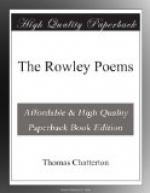But ah! unhailie[50] pilgrim,
lerne of me, 85
Scathe anie give a rentrolle
to their Lorde.
Here take my semecope[51],
thou arte bare I see;
Tis thyne; the Seynctes will
give me mie rewarde.
He left the pilgrim, and his
waie aborde.
Virgynne and hallie Seyncte,
who sitte yn gloure[52], 90
Or give the mittee[53] will, or give the
gode man power.
[Footnote 1: Thomas Rowley, the author, was born at Norton Mal-reward in Somersetshire, educated at the Convent of St. Kenna at Keynesham, and died at Westbury in Gloucestershire.]
[Footnote 2: meads.]
[Footnote 3: reddened, ripened.]
[Footnote 4: soft.]
[Footnote 5: pied goldfinch.]
[Footnote 6: drest, arrayed.]
[Footnote 7: neat, ornamental.]
[Footnote 8: a loose robe or mantle.]
[Footnote 9: the sky, the atmosphere.]
[Footnote 10: Arose.]
[Footnote 11: hiding, shrouding.]
[Footnote 12: at once.]
[Footnote 13: beauteous.]
[Footnote 14: It would have been charitable, if the author had not pointed at personal characters in this Ballad of Charity. The Abbot of St. Godwin’s at the time of the writing of this was Ralph de Bellomont, a great stickler for the Lancastrian family. Rowley was a Yorkist.]
[Footnote 15: beggarly.]
[Footnote 16: filled with.]
[Footnote 17: beggar.]
[Footnote 18: clouded, dejected. A person of some note in the literary world is of opinion, that glum and glom are modern cant words; and from this circumstance doubts the authenticity of Rowley’s Manuscripts. Glum-mong in the Saxon signifies twilight, a dark or dubious light; and the modern word gloomy is derived from the Saxon glum.]
[Footnote 19: dry, sapless.]
[Footnote 20: The grave.]
[Footnote 21: accursed, unfortunate.]
[Footnote 22: coffin.]
[Footnote 23: a sleeping room.]
[Footnote 24: sun-burnt.]
[Footnote 25: smoke.]
[Footnote 26: drink.]
[Footnote 27: pall, a contraction from appall, to fright.]
[Footnote 28: fly.]
[Footnote 29: lightning.]
[Footnote 30: steam, or vapours.]
[Footnote 31: flames.]
[Footnote 32: noisy.]
[Footnote 33: moves.]
[Footnote 34: swelled, strengthened.]
[Footnote 35: Frighted.]
[Footnote 36: burst.]
[Footnote 37: a small round hat, not unlike the shapournette in heraldry, formerly worn by Ecclesiastics and Lawyers.]
[Footnote 38: painted.]
[Footnote 39: He told his beads backwards; a figurative expression to signify cursing.]
[Footnote 40: poor, needy.]




